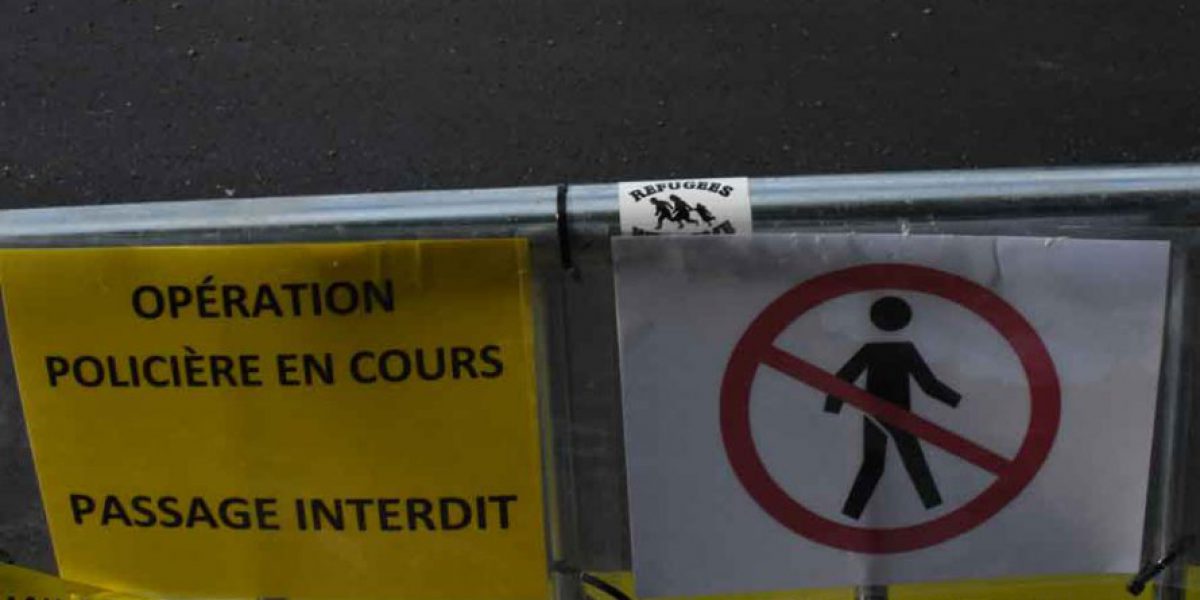Canada: U.S. Policies Pushing Asylum Seekers North
01 July 2018|Sarah Carroll, JRS/USA Director of Communications

We were at the border. Temporary structures and trailers lined the landscape, built to house and process asylum seekers. As we were making this observation, we saw asylum seekers get out from a car, suitcases in-hand filled with all of their belongings, and cross the border. I had to remind myself that this wasn’t a far-off place, with far-off problems. This was the border between the United States and Canada – these people were fleeing from the United States.
Last month, I traveled to Montreal, home of JRS Canada, with Christopher Kerr, Executive Director of the Ignatian Solidarity Network and Kristen Lionetti, Policy Director for the Office of Justice and Ecology of the Jesuit Conference of Canada and the United States to learn about the impact of U.S. policies on the recent influx of migrants to Canada. We visited the U.S.-Canada border, learned from experts about the growing number of migrants and asylum seekers crossing the border, and saw some of the services Canada is providing to these asylum seekers once they cross the border.
“The influx of migrants crossing the border irregularly from the U.S. over the last year has been astonishing,” Norbert Piché, Director of Jesuit Refugee Service Canada, told us on our trip. “In the past, there were some years when Canada saw close to 50,000 asylum seekers. But since the implementation of interception policies abroad and the safe third country agreement with the U.S., our numbers have dropped in the last decade. It is only in the past year, that the numbers have started to approach those in the past. Civil society and governments have had to respond but there is still much to do.”
Since the election last year, about 15,381 migrants have been intercepted by Canadian border authorities trying to enter Quebec. I learned that the majority of these asylum seekers are Haitian nationals leaving the U.S. because the immigration status they were given after the earthquake in 2010, called Temporary Protected Status (TPS), was threatened and has now been officially revoked by the Trump Administration. These are people who, over the past 7 years, have worked in, contributed to, and created lives in the U.S., with no option to return to Haiti (click here to read the USCCB’s report “Haiti’s Ongoing Road to Recovery: The Necessity of an Extension of Temporary Protected Status”).
The threat of loss of TPS status extends beyond Haitians. The Trump Administration has said it will consider revoking other Temporary Protected Statuses. In total, there are more than 300,000 U.S. residents from ten different countries who are under threat of losing their status. These people– our community members, neighbors, and fellow parishioners– now must face the choice of returning to a place where they could face untenable living conditions or horrific violence, live under constant threat of deportation, or flee to another country like Canada that might accept them and offer protection according to international law.
JRS Canada and the Jesuit Province of French Canada is doing its best to advocate for these refugees and to welcome them. They are working to create a culture of welcoming through community activities like the hosting a refugee simulation, and collaborating with local NGOs to help with the overwhelming essential goods and assistance refugees require, such as providing and transporting furniture.
But there is more to be done from the U.S. We must recognize that our policies have significant impacts on the lives of families and individuals who have come from places they cannot return to. Revoking TPS has and will separate families, negatively impact our economy, and diminish our U.S. leadership role in the international humanitarian community. As my time in Canada made clear, and I must advocate for a United States where no one should feel forced to flee from, and I hope that you will join me.



